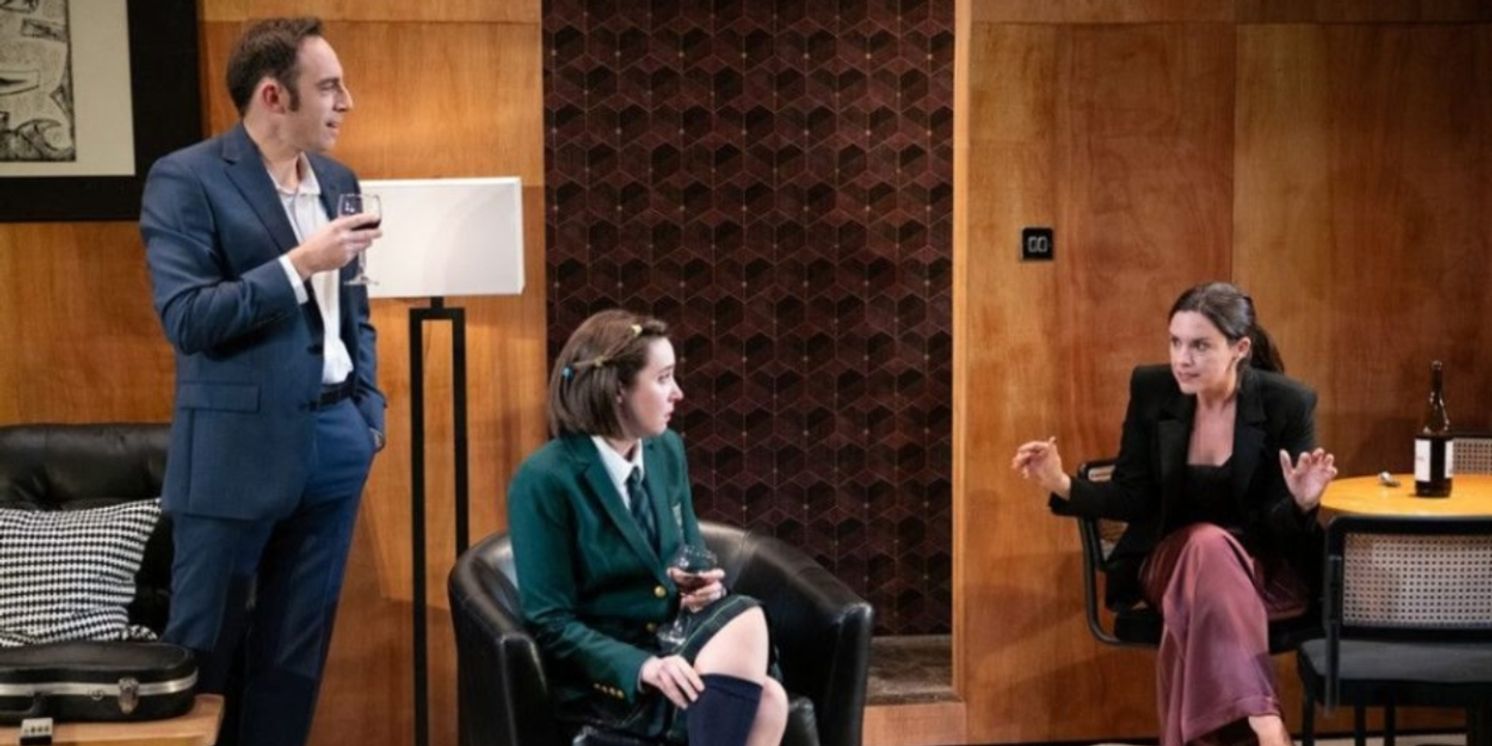Review: LOVE LOVE LOVE at Studio Theatre
Following a couple from the swingin' '60s into a new century

British playwright Mike Bartlett, born in 1980, takes up the legacy of London’s swinging 60s in his play “Love Love Love” currently running in a sharp, well-acted production at Studio Theatre.
The title comes from the fanfare of The Beatles “All You Need is Love” and specifically, their worldwide TV debut performance of the song on an ambitious international production. That puts a specific date for the play’s first act — June 25, 1967.
Kenneth (Max Gordon Moore), a 19-year-old layabout and Oxford student has it on the telly as his older brother Henry (Hunter Hoffman) returns from work, preparing for a visit from a girl he’s met. Just as Henry fears, Ken and Sandra (a dynamic Liza J. Bennett) hit it off.
Besides the mutual attraction, they both share the freeing excitement all around them in fashion, music and design — the very freshness of their generation, the impending sense that they were a part of something altogether new, different and important. And though Henry is only four years older, he might as well be of another generation altogether.
By the second act, time has jumped more than 20 years to 1990, where Ken and Sandra, now 42 are the parents of a pair of resentful teens (Madeline Seidman and Max Jackson) whose events they can hardly attend because they’re too busy working to afford their private schools.
What remains of the bickering couple’s ’60s ideals? Their penchant for wine, certainly, and maybe some notions of free love which occur through affairs.
Time jumps again for act three (so many intermissions in a time when they’ve all but disappeared!).
It’s the “present day” — the play was first staged in 2010 — as the family gathers for an unhappy event, and there is some reckoning demanded from the once idealistic parents from their Gen X offspring, who can’t afford rents, will never be able to buy their own house, and seem to be treading water in their careers and personal lives.
This is where the meat of Bartlett’s work is intended to be, but he hadn’t done much to indicate how the parents were to blame. Had they praised their kids too much and led them to believe they could do anything? Seems to me they were missing their concerts and forgetting their birthdays.
Had they turned politically conservative, as they were being blamed? I missed that part of the play. Certainly they seemed comfortable monetarily in retirement.
It’s unclear exactly what point Bartlett means to convey. And he’d probably be surprised at how a mostly boomer matinee audience reacted to a climactic moment — when the daughter demands her parents owe her a house: The biggest laugh of the day.
Minus an overt statement, it’s sure fun to watch the melodrama play out in the extremely close quarters of Studio’s Victor Shargai Theatre, where three detailed, entirely different sets by Alexander Woodward, unfold like beautiful nesting dolls behind a fast-rising curtain. The first is an appropriately cramped ’60s flat; the next a bigger and busy family landing where kids stomp off yelling. The third is a roomier-still, well-appointed but spiritually empty condo well outside the city.
There is some yeoman and -woman’s work in making the cast age each act. And how about the pair of actors who manage to span all three timezones, aging from 19 to over 60?
Moore looks a little goony in his dark greasy bangs as a teen, but pulls off the era’s cool insouciance. He gains confidence as a family man in suit and sideburns, and rather resembles Jeff Goldblum in big black glasses and white hair in act three.
Bennett has the energy to power through all her transformations — as a determined young woman with boundless enthusiasm as a teen; a working mother who can’t quite keep all the balls in the air while holding a wine glass; and a still-stylish mature woman. Her penchant to talk her way into a corner never fails her.
Seidman does a good job shifting from a wounded 16-year-old drowning in embarrassment to an angry career woman taking a hard look at her life. Jackson is convincing as a sulking teen whose alienation only grows into unsuccessful adulthood.
And Hoffman has the most thankless role of all — dealing with the irresponsible youngsters in act one, only to make an unhappy return in act three.
All are very good in what is the third Bartlett play to be directed by Studio artistic director David Muse. Studio also happens to be the leading U.S. presenter of Bartlett’s work, after staging his “Contractions” and “Cock” (twice).
Every detail is right, from “The Kids are Alright” soundtrack of 60s music that plays before the curtain rises to Montana Levi Bianco’s spot-on costuming.
And smoking, I suppose, makes for an accurate depiction of the era. Certainly the smell, which quickly drifts over the entire house activates a whole other sense that’s quite effective. But there’s so much smoking — probably a whole pack is consumed by various actors over two hours — that it triggered more than a couple of coughing bouts in the audience and one near medical concern in my matinee.
At the least there should be a warning about the smoke; at best, they should improve ventilation in the tiny space. But a smokescreen about generational problems is what had been going on all along.
Running time: Two hours, plus two 15-minute intermissions.
Photo credit: Max Gordon Moore, Madeline Seidman and Liza Bennett in “Love Love Love.” Photo by Margot Schulman.
“Love Love Love” runs through March 3 at Studio Theatre, 1501 14th St NW. Tickets available online.
Reader Reviews
Videos

